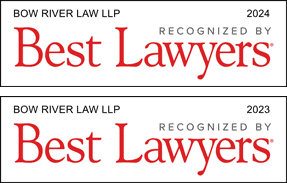- Home
- Services
- Constructive Dismissal
- COVID-19
- Discrimination / Human Rights
- Employee Sued by Employer
- Employment Contracts: Drafting / Review / Negotiation
- Employment Policy Drafting / Review
- Fiduciary Obligations
- Harassment / Bullying
- Independent Contractors
- Just Cause For Termination
- Lay-Offs
- Non-Competition / Non-Solicitation
- Professional Regulation
- Severance Review / Negotiation
- Union / Labour Law
- Workplace Investigations
- Wrongful Dismissal / Unjust Dismissal
- About
- Our Team
- Blog
- Call Now: 587-391-7601
- Contact Us
That Ain’t Fair – ABCA on Fair Disclosure for Post Secondary Discipline

Penn v. St. Stephen’s College, 2024 ABCA 99 (Rowbotham, Pentelechuk, Ho, JJA) provides a strong reaffirmation of the extent of an individual’s entitlement to procedural fairness in the context of post-secondary suspensions expulsions.
Importantly, the Alberta Court of Appeal’s reasons also extend to any administrative or regulatory proceedings that impact an individual’s ability to work. In either case, Penn affirms that an administrative tribunal or body must afford the individual the highest degree of procedural fairness – including, depending on the context and the statutory scheme at play, the right to a full hearing and full disclosure.
Facts
The following is a summary of the facts, procedural history, and issues on appeal, as summarized by the ABCA:
- The Appellant, Beatrijs Penn, was a registered psychotherapist in the Netherlands with over 30 years’ experience. She moved to Canada and sought to complete St. Stephen’s (the “College”), master’s program, which would allow her to practice psychotherapy in Canada.
- The College expelled Ms. Penn when she was nearing the end of her program. At the time of her expulsion, Ms. Penn was completing her practicum requirement.
- As part of the practicum requirement, students were required to record at least 50% of client sessions. Ms. Penn’s supervisor viewed a 20-minute clip (the “Video Clip”) that caused her concern, and ultimately influenced her decision to terminate Ms. Penn’s practicum. The Video Clip saw Ms. Penn express strong opinions against the use of pharmaceutical medication. Ms. Penn also purportedly used graphic self-disclosures, including her own personal decisions regarding medication. The College perceived that Ms. Penn was influencing the client against taking medication by highlighting negative aspects, including potential severe side effects and brain damage.
- Following the practicum termination, a disciplinary meeting was convened by the College’s Dean, leading to Ms. Penn’s expulsion from the College. Critical to the expulsion was the Video Clip, which the College did not allow Ms. Penn to view prior to the disciplinary meeting. This launched a significant procedural history involving multiple internal appeals and judicial reviews, focusing on whether the College had provided Ms. Penn with sufficient procedural fairness.
- Notably, the College’s position was that it in fact had provided Ms. Penn the ability to view the Video Clip on one occasion before her expulsion, but she was forced to reject the offer due to her having fallen ill (the College did not offer again). When Ms. Penn and her solicitor asked for the Video Clip after the expulsion, the College stated that it had destroyed the clip, as its own internal policy was to destroy internal recordings after grading was completed.
- The primary issue before the Court of Appeal for this decision was Ms. Penn’s procedural fairness, as it related to her right to view the Video Clip. Ms. Penn’s position was that denying her the opportunity to view the Video Clip was a breach of her procedural rights.
Analysis / Conclusion
As noted by the ABCA, procedural fairness is a cornerstone of Canadian administrative law. Public decision makers are required to act fairly in coming to the decisions that affect the rights, privileges, and interests of the individual. However, what amounts to sufficient procedural fairness, or the level or “content” of the duty and obligations that flow from it varies depending on the context. An individual’s rights can vary from procedures akin to the judicial process (i.e., full hearing, full disclosure rights, ability to examine witnesses) to the right to merely receive notice about the specific complaint and provide comment.
The Supreme Court of Canada in Baker v Canada (Minister of Citizenship and Immigration) established a set of factors that are used to determine the content of the duty, these are: (1) the nature of the decision made and the process followed, (2) the nature of the statutory scheme according to which the body operates, (3) the importance of the decision to the individual affected, (4) the legitimate expectations of the person challenging the decision, and (5) the choice of procedures of the body itself.
There are two foundational decisions employed by courts when considering the degree of procedural fairness owed by a post-secondary institution in disciplinary and academic proceedings, these being Kane v Bd. Of Governors of U.B.C. and Khan v Ottowa (University of). Both decisions hold that such settings call for a high degree of procedural fairness due to the implication of Baker factor # 3. Given that disciplinary decisions from post-secondary institutions can have a significant impact on the career and livelihood of the student or academic member, the institution must afford a high standard of justice and fairness to the affected individual.
At paragraphs 48-51, the Court of Appeal went on to summarize a variety of recent decisions from Academic settings. The Court noted that, while many of the cases arrived at different results, the commonality from the jurisprudence was that these settings require a “stringent degree” of procedural fairness, requiring that the affected individual be afforded the opportunity to review all relevant evidence and make submissions in their defense.
After reviewing the relevant authority, the ABCA allowed Ms. Penn’s appeal, finding that the College was required to provide her the ability to review the Video Clip and the entire video session – particularly as the Video Clip was the primary reason for terminating Ms. Penn’s practicum and her expulsion. Given the length of time that had passed since Ms. Penn’s expulsion (2015), the Court set aside the judicial review decision and quashed the Dean’s decision, noting that while the usual remedy would be to direct a new hearing, Ms. Penn had no appetite for the same and sought finality.
My Take
Penn provides a strong reminder not only for the degree of procedural fairness owed to students subject to disciplinary proceedings, but also to professionals subject to regulatory proceedings and investigations. In both cases, the individual’s right to continue one’s profession or employment is at stake – even more so in the latter context. As the ABCA reminds us, the foundational decision of Kane involved disciplinary proceedings against a tenured professor at a university. The Supreme Court of Canada found a violation of the professor’s right to procedural fairness when the individual who had imposed the sanction answered questions during deliberations without the professor or his counsel present. In determining the degree of procedural fairness owed to the professor, the SCC made the following comment, which was relied on by the ABCA in Penn:
A high standard of justice is required when the right to continue one’s profession or employment is at stake. A disciplinary suspension can have grave and permanent consequences upon a professional career.
As highlighted by the ABCA at paragraphs 51-53, procedural fairness is a construct of common law, and as such, it can be modified by the specific statutory scheme engaged (this being Baker factor #2). Many regulatory bodies have procedures embedded directly within the enabling statute, such as Alberta’s Health Profession’s Act. However, where legislation is silent on particular issues, Penn should serve as a strong precedent to ensure that professionals and students are afforded the utmost procedural fairness, which includes the right to full disclosure.
Bow River Law provides these regular legal blog articles for the purposes of legal education and research for the public and the legal profession. These articles should be considered general information and not legal advice. If you have a legal problem, you should speak to a lawyer directly.
Michael Hernandez is an employment lawyer at Bow River Law. He is a knowledgeable and skilled lawyer, handling employment law, human rights (discrimination) and labour law matters. Bow River Law is based in Calgary but we are Alberta’s Workforce Lawyers.


